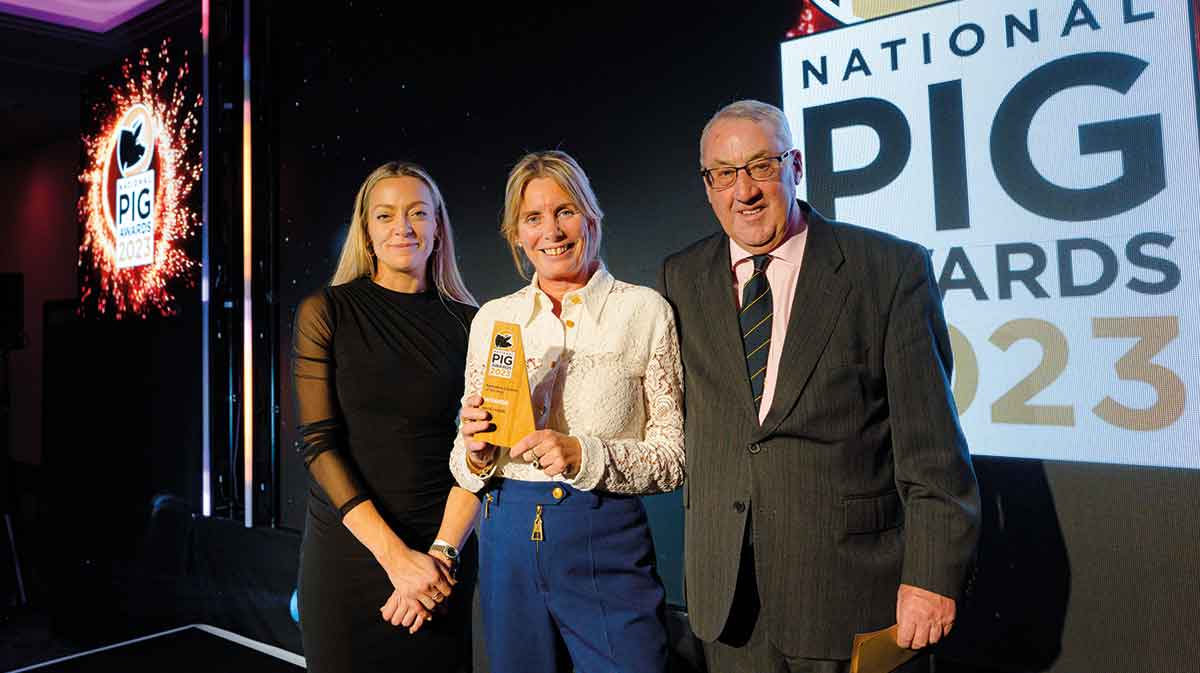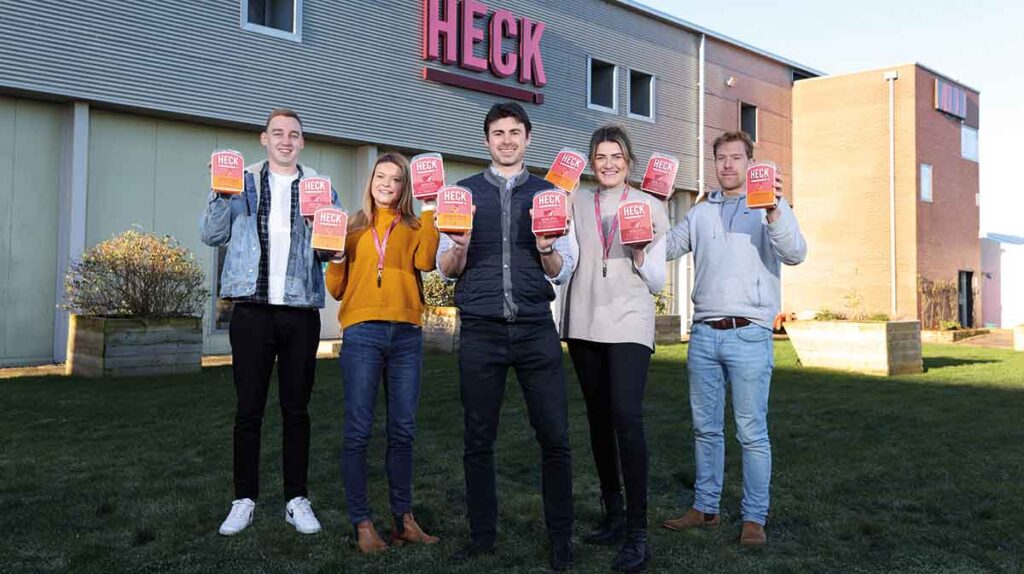HECK Foods, a family business with its roots in farming, picked up the 2023 Marketing Initiative of the year at the 2023 National Pig Awards. Its managing director Andrew Keeble told ALISTAIR DRIVER the secrets of its success
The UK pig industry is good at producing and processing pork. But, with some very notable exceptions, it is not consistently effective, across the board, at developing new and exciting products and marketing them effectively.
One of those shining exceptions is North Yorkshire premium sausage market leader HECK Foods, which puts marketing, with a strong focus on British farming, at the very heart of what it does.
This deservedly earned it the Marketing Initiative of the Year title at the 2023 National Pig Awards.
HECK in brief
- Family-run business founded in 2013 by Andrew and Debbie Keeble
- Headquarters and factory at Thirsk, North Yorkshire
- Supplies all major UK supermarkets
- Market leader in premium sausage market
- Sources only British pork shoulders for sausages
- Pork sausages contain 97% meat
- Also produces chicken and vegetarian sausages, burgers, mince, meatballs, sausage bombs and newly launched sausage rashers
- Turnover £27m
10 years in business
Last year also saw the successful family-run business celebrate its 10th anniversary, as it looks to move forward after a difficult post-Covid period, where food and wage inflation created challenging times for farming and food manufacturers.
Founders Andrew and Debbie Keeble have been in the industry ‘since the year dot’, and the company came about in the aftermath of a difficult time when they sold their first business to Dutch meat giant Vion.
“We lost control over our core values, such as meat supply and sourcing. So, taking everything we had learned, we said “What the heck? Let’s start again” – that’s how the name came about,” explained Andrew, the managing director.
Not only are Andrew and Debbie still very much involved, three of their children – Jamie, Eli and Roddy – are also working in the company.
“We started out as a family business and never want to sell again – the plan is for this to be a legacy business for generations to come,” Andrew said.
The HECK factory, near Thirsk, was built on the site of the old family pig farm, and while that has gone, they still run a 1,000-acre arable farm, which is farmed by David, Debbie’s father, and Guy, who is Andrew and Debbie’s eldest son.
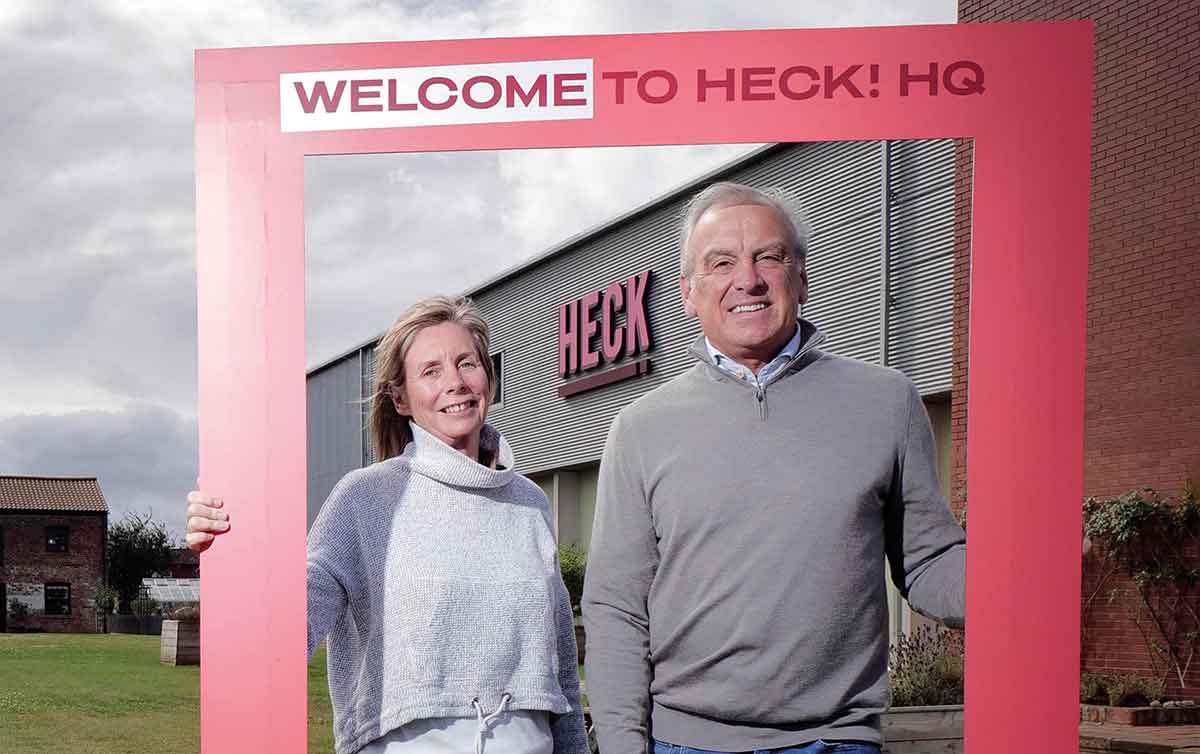
Philosophy
HECK’s philosophy includes an unwavering commitment to quality, support for British farmers, continual product development, strong branding and a determination to maintain its independence.
Its pork sausages contain 97% meat, the highest on the market. This compares with the usual 80-85% for premium ranges and the minimum requirement of 42% at the lower end of the quality scale.
“People buy our sausages because of the high meat content, although some still ask what the other 3% is. It is quite simply salt, pepper, nutmeg and so on. There’s no water – it’s the seasoning,” Andrew said. “I like to say, it’s like a Sunday roast without the crackling!
“Our success has been as much about marketing as product. We looked at the shelves, and it was dull – at the time, it was largely blue and black trays for sausages. It needed livening up and it needed some colour, so we brought out a lot of colours and broke the mould with the packaging.
“It needed a strong brand and a strong back story and we wanted to focus on a younger audience. When we launched, we specifically focused on the 18-45 age group because they weren’t engaging and they weren’t buying sausages.
“We wanted to bring new people into the category, particularly younger, more health-conscious individuals. We also went down the gluten-free route and introduced the first chicken sausage into the aisle, which was an instant hit with slimmers.”
HECK’s new sausage rasher
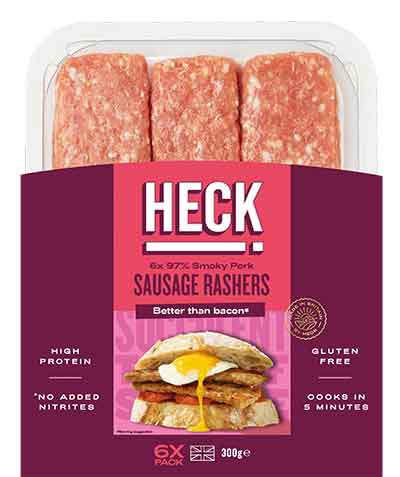 HECK has just launched a new product in the UK, the sausage rasher. Already a big category in the US, known as the sausage strip, it was Initially launched in Sainsbury’s, and will be stocked in all the UK supermarkets.
HECK has just launched a new product in the UK, the sausage rasher. Already a big category in the US, known as the sausage strip, it was Initially launched in Sainsbury’s, and will be stocked in all the UK supermarkets.Backing British farmers
HECK supplies a variety of products alongside its renowned and variously flavoured pork, chicken and vegetarian sausages to all the major UK supermarkets. With a turnover of about £27m, it accounts for 55-60% of the premium sausage market.
A key strand of its marketing approach is ‘pushing the Britishness of the products’, Andrew explained. HECK uses solely British pork shoulders from 6,000 pigs for its sausages.
The products are all manufactured at its Thirsk factory, another point of differentiation. “As far as I know, we are the only independent brand using totally British pork,” he said.
“We make everything from scratch at our own facility – today, we’re making 30t of sausages here. Other premium sausages brands don’t actually make anything – they get them manufactured by a big company and stick their name on it. We are what we say.”
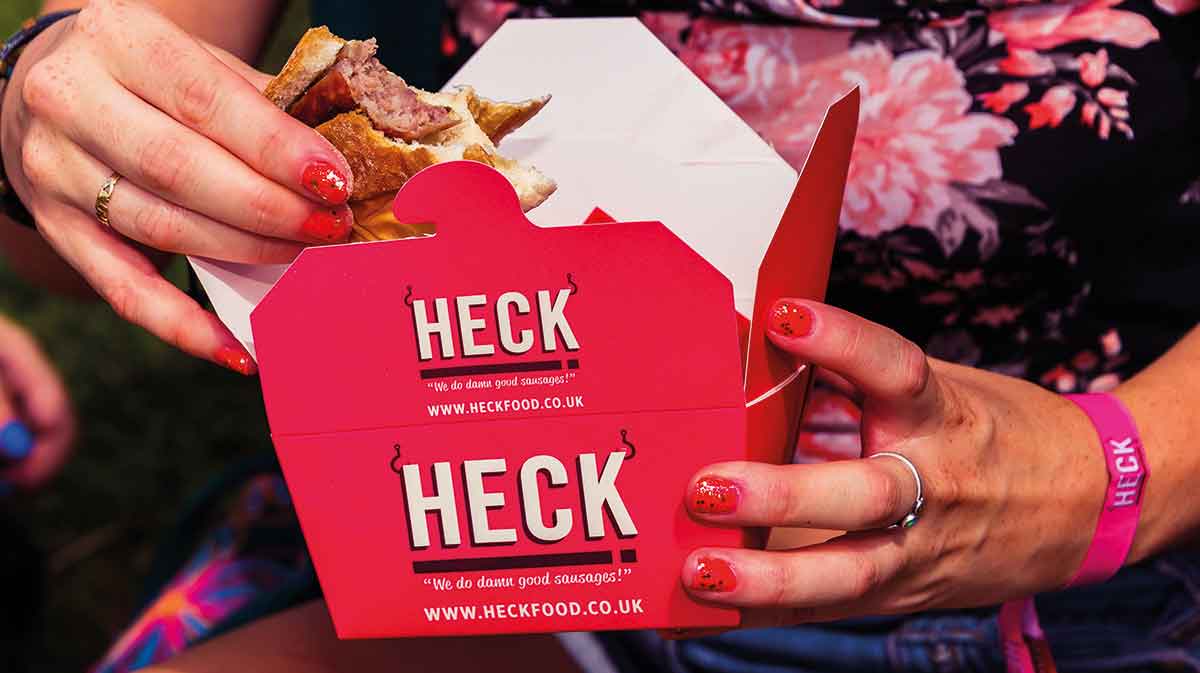
Sourcing
As the cost of its most important raw material, pork, has risen over the past two years, the business has looked at putting down its own sows, but concluded that, because it is only using one part of the pig – the shoulder – it wouldn’t pay.
“We’d need 1,000 pigs a week and we couldn’t breed that many,” Andrew said. “We did an exercise putting the whole carcase through – loins, legs, the whole thing – and for that, we needed around 600 pigs a week. That’s still a 1,200-sow herd and we just couldn’t get the labour to do it.”
The company sources all its pork from 26 different indoor units, via the big UK processors, including Cranswick, Karro and Woodheads. It has never gone down the outdoor-bred route.
“We buy British – that’s all we buy, and it’s very important to back pig farmers. British pigs are high welfare and, as former pig farmers, we know what’s best for the animals. There is a lot of noise and confusion about outdoor-bred or reared.
“Roddy carries out farm inspections and we audit the hauliers, lairage and slaughter plants as well. We are visiting the whole time, so we can say that, for all the pigs we are supplied, the husbandry is excellent.”
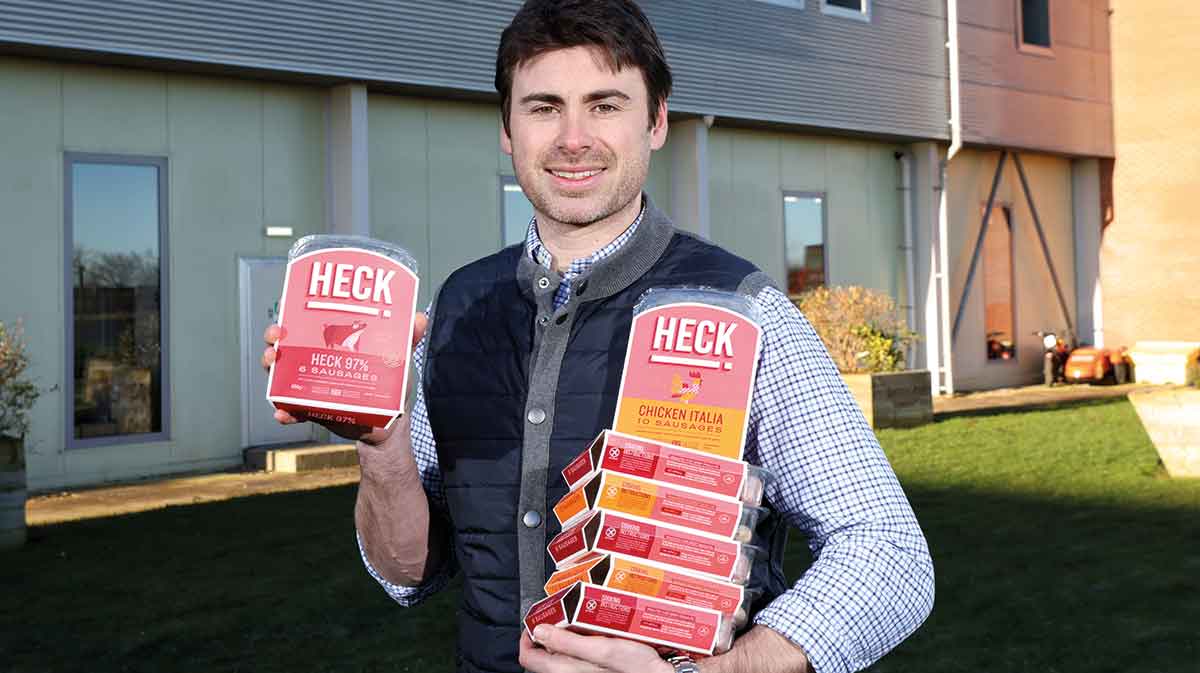
Pig farmer pressures
Andrew is conscious of the pressures pig farmers have been under recently, and the fact that, although the market has stabilised, there has been little sign of herd recovery to pre-crisis levels.
“I would like pig farmers to have confidence to keep producing more pork, because the pork sausage market has retracted over the past few years and we’d like to build it back up again.”
HECK tries to engage with the farmers who supply it and build relationships, encouraging farmer-suppliers and breeding companies to come on factory visits.
“A lot of pig farmers feel divorced from what happens. There are those who sell pigs and just get the cheque, but we want them to see what happens after the farmgate,” Andrew added.
He said retailers have been very supportive of HECK over the years, as brands have consolidated massively, particularly over the past 18 months, due to the pressure on consumer pockets.
As a premium product seller, HECK felt the effect of food inflation and the consumer squeeze on its financial performance, as consumers sought cheaper alternatives.
“Many companies have not survived the post-Covid dip. For us, coming out of Covid was about steadying the ship. But we are back on track and we are aiming for modest growth next year,” Andrew said.
Another huge challenge the company faces, along with many others, is labour. “We are in a very rural area and labour availability is a challenge. Plus, the predicted living wage increase is 9% and, in two years’ time, wages are predicted to be £15/hour, so we have to prepare for that.”
However, he insisted that HECK will never respond to these challenges by trying to ‘value engineer the products’.
“We will always keep quality at the forefront,” he said. “One way we can ensure we continue to compete is by investing in manufacturing technology. You can’t drag your prices up in this marketplace in response to higher costs, so I’d rather become more efficient, which we have done by, for example, automating the process of putting sausages into trays, reducing our reliance on labour.”
HECK has also been looking very closely at its carbon footprint. “The reality is that British pork has a very low effect on carbon emissions. However, soya is the big tipping point and there is a lot of work to be done with UK feed manufacturers on what they are using,” he said.
The family farm produces ingredients for a lot of the pigs and chicken that go into HECK’s products, via a nearby feed mill. This includes rapeseed, which is high in protein and a possible alternative to soya.
Vegan hype
While HECK’s range includes vegetarian products, it discovered that the hype around vegan food was not reflected in the marketplace.
Having entered the vegan market with a bang a few years ago, it was forced to cut its vegan range down from about 15 products to just two. “We believed the hype and then found the market was not interested,” Andrew said.
He described the ‘huge valuations’ around some vegan businesses as ‘hugely questionable’ and is sceptical as to whether ‘meat mimics’ will ever take off, questioning their taste and their environmental credentials, with ingredients sourced from across the globe.
He pointed out that while retailers, at one stage, reduced their meat shelf space to make room for bigger meat-free sections, in many cases these have now shrunk back due to lower-than-expected sales of meat-free products.
“We think meat-free will come again, but with things that are grown in the UK that taste really good. We have a fantastic three-cheese sausage, which is not vegan but meat-free, using UK cheese, and a really tasty beetroot and horseradish sausage – again, all UK sourced,” he said.
Marketing award
HECK does virtually everything in-house, including marketing and packaging design. “Nothing is done externally and that has helped us be efficient and price competitive. We are very proud to be consultant-free,” Andrew said.
He said it was a real boost to win the marketing award. Two years ago, HECK invested £1m in a national TV campaign, which raised its profile during the Covid pandemic.
A second TV ad followed, featuring its own staff members dancing around HECK HQ, while the company has also launched its own farmers’ market and factory outlet to provide more avenues for its sausages.
“We have a very young and enthusiastic team – I’m the only dinosaur in the business. The big thing is that we do it all ourselves,” he said. “We try to get across that we are the only brand that makes the product ourselves – nobody else does it – and our Britishness.
“As an industry, we have to look beyond simply producing the product. It is all about engaging the consumer.”
